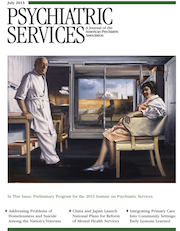Individuals with chronic mental illness and high utilization of emergency services present a challenge to psychiatric emergency departments. Among the strategies for working with these patients is assertive community treatment (ACT). One of its main advantages is that patients become well known to their case managers, who can in turn readily provide comprehensive collateral information to emergency services clinicians. This information promotes clinical decision making (such as to discharge or admit quickly), resulting in a reduced length of stay. Another potential outcome is fewer emergency visits overall. When a delay in obtaining this information occurs (outside ACT’s operating hours, for example), emergency department clinicians need access to this information by another method.
Community Focus (CF) is a program in San Francisco that uses an ACT approach to treat high utilizers of psychiatric emergency services. A multidisciplinary staff provides comprehensive, culturally sensitive services to 200 such patients in the city. Despite this coverage, some CF clients make frequent visits to the psychiatric emergency services of San Francisco General Hospital (SFGH), and many visits result in extended stays. To address this problem, a multidisciplinary group, with representatives from CF and the SFGH psychiatric emergency service and administration, began meeting regularly to develop treatment plans for these patients. The goal was to implement the treatment plans when CF patients next presented for psychiatric emergency services, thereby decreasing these visits and lengths of stay.
Treatment plans are well-established strategies to improve patient care. The challenge to the emergency services treatment team was to ensure immediate and complete communication of the plan. Given that various emergency staff may not be familiar with particular patients, we created pop-up treatment plans that appear in the electronic record the moment the triage nurse enters a patient’s name into the system. Thus, for example, for a patient for whom acute hospitalization had been shown to be ineffective, the electronic treatment plan may assist with immediate diversion before inpatient admission or facilitate rapid triage of the client after clinical evaluation by providing the case manager’s name and pager number with appropriate directions.
To date, eight treatment plans have been created for CF patients. Of these, outcome data one year after implementation are available for five. For the year before implementing the electronic treatment plan, the five patients utilized 1,158 total psychiatric emergency service hours over 72 episodes. Postimplementation, these patients utilized 951 hours over 65 episodes, a reduction of 207 patient-hours and seven episodes. Assuming approximately $100 an hour for a psychiatric emergency visit, this equates to over $20,000 in county health care savings for these patients. Reduction of patient-hours was proportionally greater than the reduction in episodes, which may indicate that its greatest effect is in improving the speed of disposition. Further, for the year before treatment plan implementation, these patients had six hospitalizations totaling 90 days. In the postimplementation year, there were only three hospitalizations, totaling 15 days, a reduction of three hospitalizations and 75 hospitalization days. Assuming approximately $1,500 for each hospital day, these automated treatment plans appear to have saved over $110,000. Given that overcrowding of psychiatric emergency services and inpatient facilities is an ongoing issue, these electronic treatment plans appeared to help with reallocation of limited resources to other patients who needed them.
One limitation is that the reduction in utilization of psychiatric emergency services and inpatient services may not be due to the pop-up treatment plans. Other explanations include improvement in outpatient services or a “halo effect” by those who knew of the focus on these patients. The patients also may have had an overall improvement in their disorder. That said, we selected these specific patients as we developed these plans because they had been challenging for CF and the psychiatric emergency service providers for years. These automatic displays of treatment plans worked very well for patients with active ACT teams. It is unclear how generalizable this approach would be for patients that do not have such active involvement of an outpatient team.
Our literature search did not find any prior article reporting automatic display of individualized treatment plans in the psychiatric emergency service setting. This feature ensured that psychiatric emergency clinicians saw collateral information immediately, presumably altering their approach to the patients. Given the challenges in contacting collateral sources during off-hours and the increased utilization of electronic medical records in multiple public health care settings, this approach seems reasonable for improving patient flow. Other psychiatric emergency departments with electronic records could consider building this functionality into their systems to improve care and decrease unnecessary service use.

